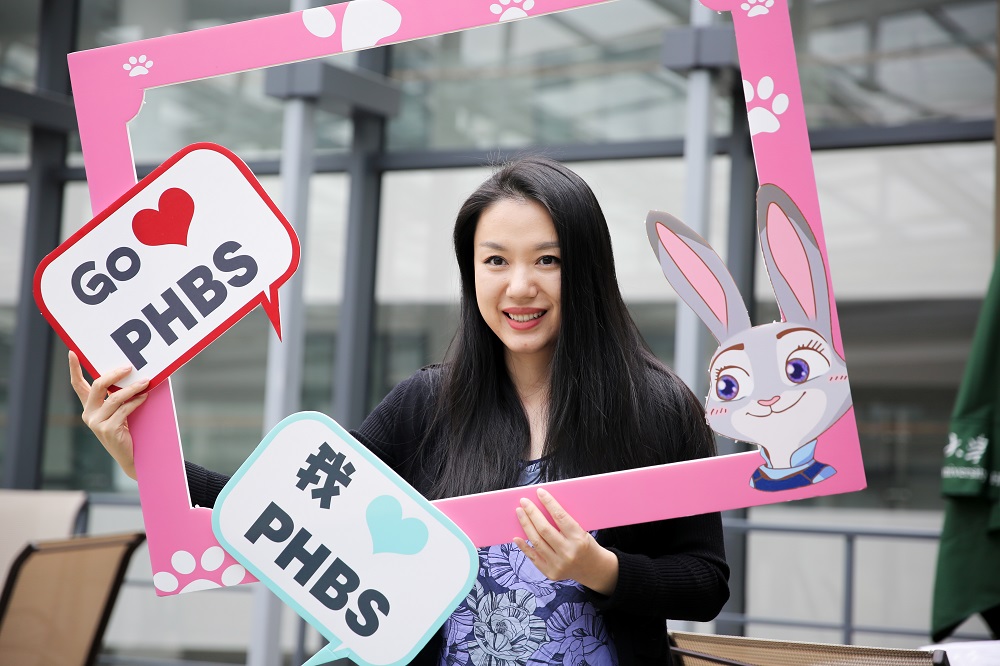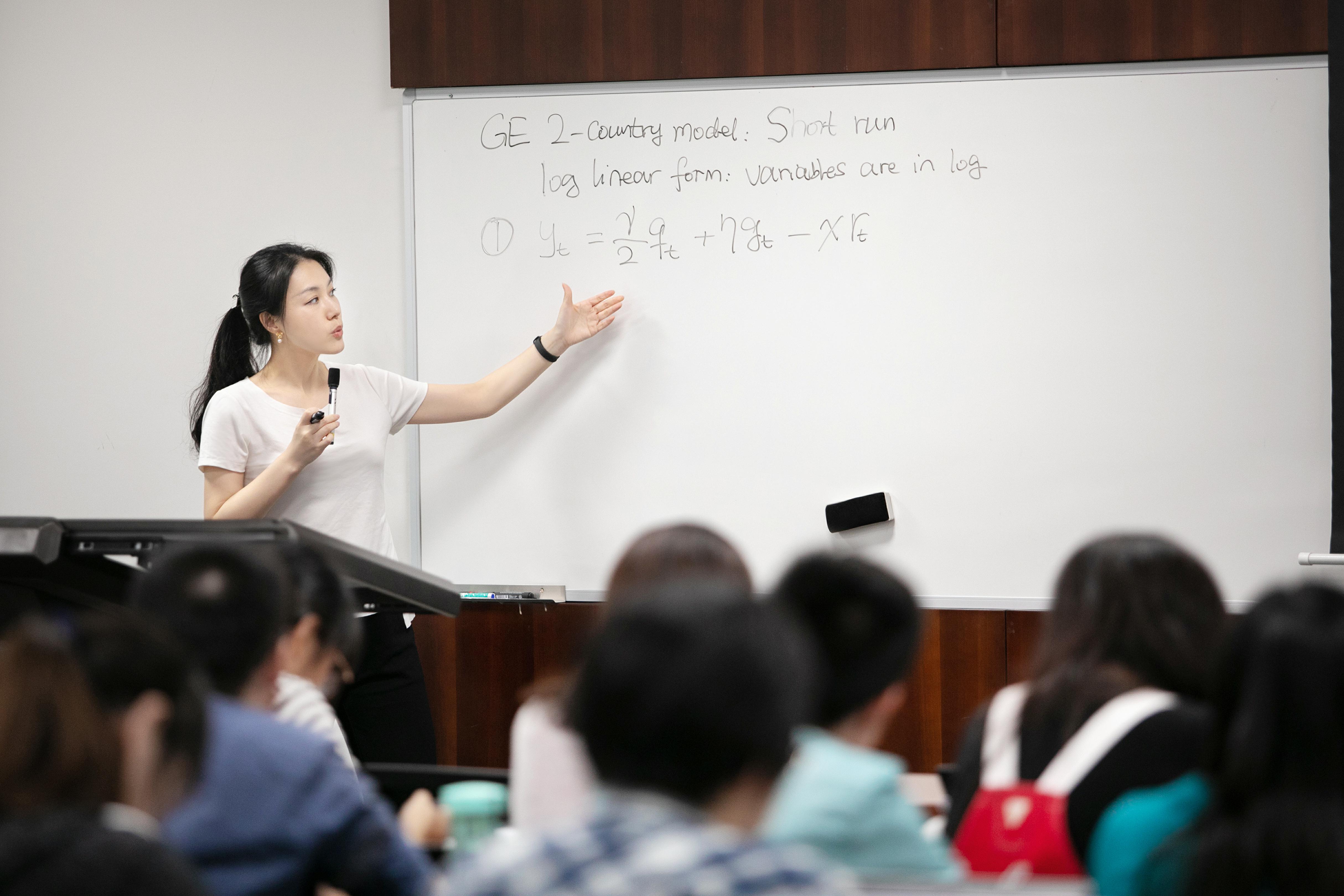By Daniel Bonfil
Edited by Priscilla Young and Annie Jin
First published in the PHBS Magazine
First year, international master's student in economics Daniel Bonfil (Mexico) met with Assistant Professor Shi Jiao, Ph.D. to learn what led to her academic career in economics, her advice for students, and experience serving as vice director of the Sargent Institute of Quantitative Economics and Finance. As he relates in the introduction to his story, the conversation didn't start out as Bonfil expected.

I arrived early to meet with Professor Shi Jiao expecting to start the conversation about her field of specialization and had just double-checked my figures on Chinese foreign direct investment (FDI). I certainly wanted to be sure I had the numbers right. Yet, before I could ask my first question, Shi started “interviewing” me. She was interested in why an economics student had volunteered to write a feature article. Was writing my hobby? Did I like to read? What kind of books did I enjoy? To my amazement, we discovered a mutual interest in one of my favorite magical realism novelists, Haruki Murakami. Shi talked about Murakami, relating, for example, that he is a runner, and then she recommended one of his best-known books Norwegian Wood. I promised I would read it. Then finally, it was my turn to start asking the questions.
Divergent Pathways
Well known for its hot, spicy cuisine, pandas, mahjong, and easy-going lifestyle, Chengdu, Sichuan Province, was home to Shi. The only child of a middle-class family, Shi said that like most young Chinese she studied hard and focused on doing well enough on national college entrance examination (gaokao) to attend a top-tier Chinese university. However, unlike most, she went to a boarding school as a teenager, which provided her first experience developing peer relationships. She said that as a child she mostly kept close to her parents and supposed that leaving for the boarding school was similar to what most students experience when leaving for college. However, her pathway to higher education took an early, radical turn. Encouraged by her father, Shi made early application to the University of Wisconsin-Madison, and to her surprise and delight she was accepted into the bachelor's program. This meant she could by-pass the dreaded gaokao.
Seeing the‘Big Picture'
When asked what was the greatest challenge during her overseas college experience, Shi replied that it was during her Ph.D. program. “I realized that there were people better trained to face that level of studies. That was the first time in my life I felt the lack of knowledge, not knowing what my peers knew already. It was very stressful.”
She said she thinks it is similar to what international students face here. “Students at PHBS are top students from some of the best universities and with the best scores. So, it is inevitable that many find themselves under heavy pressure,” she said. “The reason is precisely that all students at PHBS are top students in their fields, so how to deal with this situation?”
Shi Jiao teaches international finance
Her advice for students: “You need to be strong and allow yourself to see the big picture. Being with very competitive peers and trying to be the best in all the fields will disable you from performing well.” Shi said that people have different backgrounds and different career perspectives which means that each individual will absorb the part of the education that is more suitable for him or herself. “If you have a strong belief to be the best, that helps to motivate action, regardless if you feel the situation is positive or negative,” she said. “If you consciously anchor the situation and think about your current strengths and weaknesses, then you realize that your educational outcome depends on how you exploit that knowledge on a personal level, how you interpret the situation.”
On the notion of competitiveness, Shi said, “Students should not see each other as competitors, which is stressful, but rather see each other as colleagues. Make what could be stress into an experience to motivate yourself and others.”
The Road to Shenzhen
With her international education, Shi could have made a variety of choices about her next move. What brought her to Shenzhen?
Shi said that she wanted to be close to her parents again and that it would have been too difficult for them to be in the US. Then, there was the opportunity that PHBS offered what she saw as unique and highly motivational. “I was inspired by Dean Hai Wen and his contemporaries,” Shi explained. “Back in the 1990s they were pioneers in this field and had to struggle with uncertainty because their aim was to formally create modern economics education in China. Furthermore, they earned a salary equivalent to a tiny fraction of what they could in a research position in the US.” Shi said that she was lucky to be able to return to China to work in an institution that could provide an existing international research environment.
“Finally, it all appeared to be happening in Shenzhen, the most dynamic and innovative city in China,” Shi said. “There is a kind of energy you can only get in a place like this, where you can witness first-hand the unfolding of modern China and how people live with a dynamic and entrepreneurial mindset.”
‘You Can Learn So Much by Knowing an Excellent Person'
Part of her faculty responsibilities at PHBS include serving as vice director of the Sargent Institute of Quantitative Economics and Finance (SIQEF), and Shi said it has been a bonus regardless of the workload. (Please see the related story on Thomas Sargent and SIQEF, page 10-15).
Said Shi, “Professor Sargent told me, ‘I hope you're being well paid!' What he did not know is that I would be willing to pay for this job! He is someone that everyone in the economics department looks up to. Yet when you get to know the person, you are able to see a kind, humble man who cares enormously about his students, their personal development and understanding of the subjects.”
According to Shi, Sargent has an easy-going approach toward the most basic and most challenging concepts, and she finds this truly inspiring. “It is humbling to see him take time to explain small details with an enthusiastic smile. It is a contrast worth learning from. Here is a Nobel Prize winner willing to take his time to make sure his teaching prevails. Because of this, I would like to continue learning from Professor Sargent.” In the coming years, Shi said that she wishes to help the institute become stronger both in teaching and in research by developing projects with such PHBS partners as Ping An Technology. She also wants to contribute to the Ph.D. program whose rigorous training she equates with that in the US.
Foreign Direct Investment
At last, I got to check my understanding of foreign direct investment in China with Shi, who explained the goals of Chinese FDI and clarified why it has a resource-oriented outlook. She surprised me again when talking about special economic zones and her knowledge of the Mexican maquiladoras (factories that operate under special tariff arrangements between Mexico and the U.S.), one of the first such projects implemented by the government in the 1980s. As it turned out, the FDI side of the interview on which I had planned to start the interview was, indeed, interesting but not the headline. Through this experience I learned that it is easy to perceive professors as only being driven by the subject they teach. However, without the context of their personal stories, struggles and wisdom we lose out on gaining new perspectives. Now, to follow Shi's advice: it's time for me to read Norwegian Wood.
















